 |
Daily Blog - Tiger Software Send any comments or questions |
|
American Destiny? World Policeman? July 27, 2007 Imperial America? Fortress Americana? Check current Oil Prices Whoever becomes President in 2009 will have to pick up the pieces of American foreign policy and assemble them into something that reverses the simultaneous trends towards: 1) militarization (where the logical extension is an isolated and undemocratic, unconstitutional American garrison fortress), 2) pauperization of middle and working class America and 3) diplomatic isolation and growing anti-Americanism abroad and here, too! By January 2009, the massive US trade and governmental debts will have brought the dollar into further decline. Interest rates will surely be much higher. The US will not much longer be able to outspend all the rest of the world in military spending. The US stock market has been boosted by an overseas boom in investments. Will that continue if the dollar keeps declining? In place of US unilateralism and preemptive war must be forged a new internationalism that recognizes the limits of American military power and accepts the reality of the massive economic growth in Europe, Asia and now Brazil, too. The US dependence on foreign oil must end somehow. It has clearly ensnared the US in Middle Eastern hostilities that pre-date America by 1000 years. Bush has made matters much worse. Al-Quida's brand of Islamic fundamentalism would, without the the Bush Administration's reinforcement of its stereotypes, be in further decline. Just as economic growth was ultimately inconsistent with messianic Communism, a growing Arabic and Iranian middle class is inconsistent with messianic Islamic fundamentalism. Two of my professors at Columbia have written books on these themes:  Zbigniew Brzezinski The Choice: Global Domination or Global Leadership Brezizinski is brilliant. But he was wrong about the US war in Viet Nam in 1965. There were no dominoes. And he was wrong about Eastern Europe. I wrote a seminar paper for him at Columbia based on sources in the Radio Free Europe library in NYC which demonstrated the necessarily liberalizing forces of simple economic growth. He gave me only an A-, only checking with approval those points in my paper that agreed with this dogmatic view that Communism was a mostly unchanging totalitarian state.  Chalmers Johnson has written forcefully about the "Sorrows of Empire". Here is what Wikopedia has to say: "Johnson believes the enforcement of American hegemony over the world constitutes a new form of global empire. Whereas traditional empires maintained control over subject peoples via colonies, since World War II the US has developed a vast system of hundreds of military bases around the world where it has strategic interests. A long-time Cold Warrior, Johnson experienced a political awakening after the collapse of the Soviet Union in 1989, noting that instead of demobilizing its massive armed forces, the US accelerated its reliance on military solutions to problems both economic and political. The result of this militarism (as distinct from actual domestic defense) is more terrorism against the US and its allies, the loss of core democratic values at home, and an eventual disaster for the American economy." (Source: http://en.wikipedia.org/wiki/Chalmers_Johnson ) Johnson has written what should be required reading for long-term investors: Blowback: The Costs and Consequences of American Empire From Publishers Weekly This no-holds-barred indictment of what Johnson calls the post-Cold War American "global empire" is not for the faint of heart. Among the opening images is a plastic bag containing three pairs of bloodied men's underwear gathered as evidence from the brutal 1995 gang rape of a 12-year-old Okinawan girl by two American marines and an American sailor, a crime that was officially passed off as an aberration but may qualify more accurately as another move in the endgame of, in Johnson's astringent phrase, "stealth imperialism." In his highly critical appraisal of the global U.S. military presence, Johnson, president of the Japan Policy Research Institute and prolific commentator on Japan and Asia, focuses on the effects of "blowback," a term coined by the CIA to denote the unintended consequences of policies that were in many cases kept secret from the American public. From anti-Chinese pogroms carried out by U.S.-trained soldiers in Indonesia to the viciously suppressed 1980 pro-democracy demonstration in Kwangju, South Korea, Johnson examines the fallout from what he sees as American "economic colonialism." Detailed assessments of American engagement in Japan, Korea and China are coupled with closer-to-home observations on the liquidation of American jobs in places such as Birmingham, Ala., and Pittsburgh, the latter yet another consequence of the massive U.S. trade deficit with the countries of East Asia. Brazenly spending ever-swollen defense budgets, Johnson argues, the Pentagon is fueling an "antiglobalization time bomb" that could blow up at any moment. His chilling conclusion--backed by copious and livid detail--is that a nation reaps precisely what it sows. (Apr.) Profound Pessimism I talked with Johnson recently at a book signing. He is profoundly pessimistic. The US stock market may now be starting to reflect his dismal expectations for the US economy and the American middle class. Look at the current Peerless chart of the DJI, the current Tiger chart of US Housing Stocks and the 5-years charts of Boeing and Halliburton. The US economy is fragmenting and Americans are becoming frightened. Perhaps, it's time to read Gibbons on the Decline and Fall of the Roman Empire to see if we can learn something from history. For years, British universities offered this a required reading. They were smart. They wanted to keep their empire around for a long time. DJI - 7/26/2007 Note DJI fell nearly 200 more today. 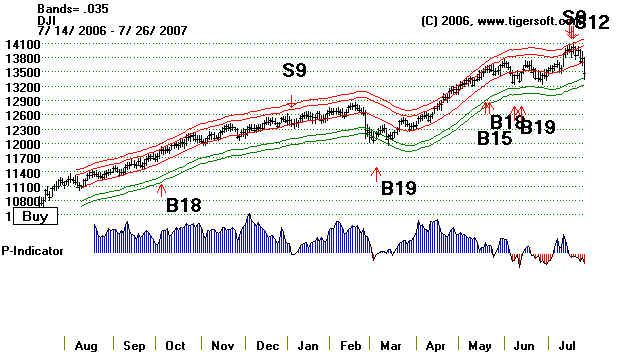 Tiger Index of 30 US Housing Stocks - 7/26/2007 Please note: we like to trade with the trend of the last major Peerless signal. This is a Sell. So, don't trust the short-term Buy. 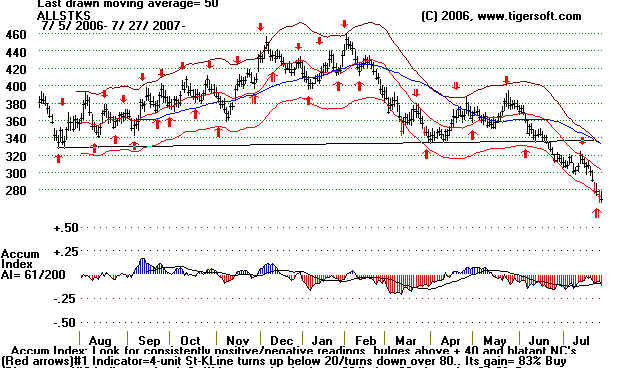 Boeing Weekly - Five Years: 2002-2007 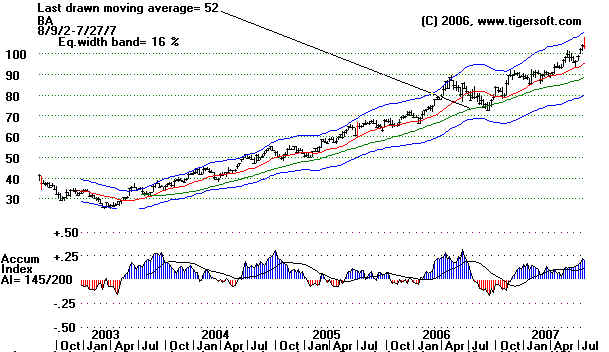 Halliburton Weekly - Five Years: 2002-2007 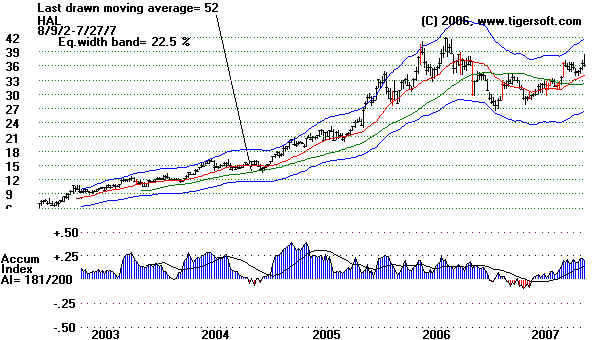 Watch all these charts along with Crude Oil. Will there be an attack on Iran next? See blog from earlier this week. 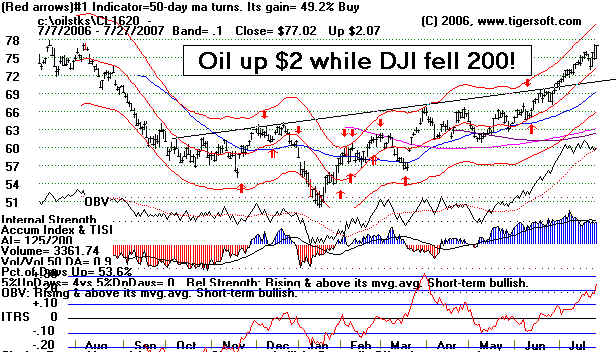
|
| . . . .
|